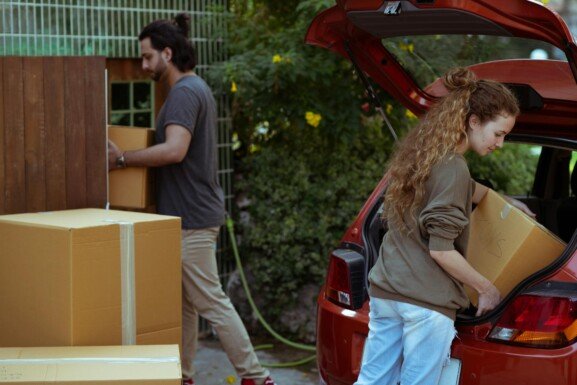How to Move to Europe in 2025 Without Losing Your Mind
Allow me to get real for a second, when I first started even thinking about moving to beautiful Europe, it made me ponder a lot of things especially with the preparation part. I had this fantasy: cobblestone streets, dangerously good espresso, maybe a salty breeze off the coast if I was lucky. How to move to Europe as an American? Absolute chaos. Picture me, lost in a wormhole of government websites and Reddit rabbit holes at 2 a.m., half convinced I’d accidentally signed up for a visa to Mars.
Every country’s got its own rules, deadlines, and… let’s call them “personality quirks.” It’s a lot, I won’t lie. But—and here’s the kicker—once I sat down and broke it into chunks, it didn’t just get manageable. It got exciting. Suddenly, I could feel getting closer to my goal more and more as the days go by.
If you’re staring at European adventure like a puppy outside a bakery window, pawing at the glass and not sure where to begin—this one’s for you. Remote worker? Retiree? Or just plain restless? Strap in, here’s how to move to Europe without losing your damn mind.
Step 1: Decode the Visa Circus
Europe? Not a monolith. If you’re not from the EU or EEA, you can’t just waltz in and hang forever (cheers, Schengen Zone). But here’s the silver lining: more and more countries are rolling out the welcome mat for non-EU folks.
You’ve got options, like:
– Digital Nomad Visas
Basically a golden ticket for remote workers. Portugal, Spain, Croatia, Estonia—they’ll let you live there while working your laptop magic for companies anywhere.
– Non-Lucrative Visas
For the lucky ducks with passive income or retirees. Spain and Greece, for instance, say “show us the cash flow, and you can chill here.”
– Freelancer Visas
If you’re your boss, check out Germany, Czech Republic, Italy. They’ve got visas for the self-employed crowd.
Heads up: Every visa has its own weird hoops—income minimums, lease agreements, private health insurance, squeaky-clean criminal record, you name it. Your new best friend? The consulate website for wherever you’re aiming.
Step 2: Find a Crash Pad (Don’t Lock Yourself In)
Once the visa wheels are turning, it’s time to figure out where you’ll land. Pro tip? Rent before you buy—or even sign a long lease. You want wiggle room to suss out the vibes before settling in.
Start hunting on:
– Idealista (Spain & Portugal? Chef’s kiss)
– Spotahome (turnkey furnished spots, short- or mid-term)
– Facebook expat groups (where the real tea gets spilled)
– Immobiliare for Italy, ImmoScout24 for Germany, and local sites for the deep cuts
Expect to see everything from:
– Slick, modern studios downtown
– Weirdly charming old flats with ancient tiles and ceilings so high you’ll get vertigo
– Neighborhoods where English is extinct (and honestly, that’s half the fun)
Oh, and sometimes you’ll need a lease just to *apply* for the visa. Annoying, but true. If you’re in that boat, maybe hire a relocation pro or take a quick trip to scout out places IRL.
Step 3: Actually Live Like a Local (Don’t Be That Foreigner)
Europe is all about the good stuff—each country’s got its own groove. Lean in, don’t fight it.
A few flavors:
– Spain: Slow, social, built around plazas, tapas, and never-ending lunches.
– Germany: Efficient to the point of intimidating, super green.
– Portugal: Chill, affordable, seaside sunsets, people who actually smile at you.
– Italy: Food, family, and more food. Also, art and random beauty everywhere.
– Netherlands: Bikes, freedom, straight-talkers, canals for days.
Even if your language skills are… let’s say “emerging,” learn the basics. How to say hi, how not to get trampled at the market, what hours stores actually open (spoiler: not Sunday afternoons). The more you roll with local customs, the more fun you’ll have. Promise.
Step 4: Get your documents sorted
Here is the important but a little boring part so please don’t sleep on it.
Healthcare: Most countries want you covered with private insurance for visa approval. Once you’re in, you might score access to killer public healthcare. Cigna, SafetyWing, Allianz—all big with expats.
Banking: Some banks are super picky about residency. Digital banks like Revolut or Wise can save your butt. Bring all the papers—passport, visa, address proof, tax ID, the works.
Phone & Internet: Buy a prepaid SIM the second you land. Internet’s usually fast and cheap in cities.
What to scan/copy/hoard just in case:
– Passport
– Birth certificate (sometimes translated & apostilled—good times)
– Rental agreement
– Proof of funds
– Health insurance letter
– Visa receipts
– Background check (from home, usually)
Back up everything. Seriously.
Step 5: Let the Chaos Wash Over You (And Enjoy It)
Moving to Europe ain’t all wine and roses. There’ll be paperwork. Delays. Maybe even a meltdown in a town hall where nobody speaks your language and the printer’s broken for the third time.
But you know what? Every moment should be balanced by something beautiful, those early mornings in ancient cities, beach walks at sunset, random friendships that make you wonder why you didn’t do this sooner. And one day you’ll look around and go, “Wow, I actually got through it”
So yes, bring patience, a sense of humor, and maybe a backup power bank. The rest? You’ll figure it out.
To know more about this – check out Outplore!



